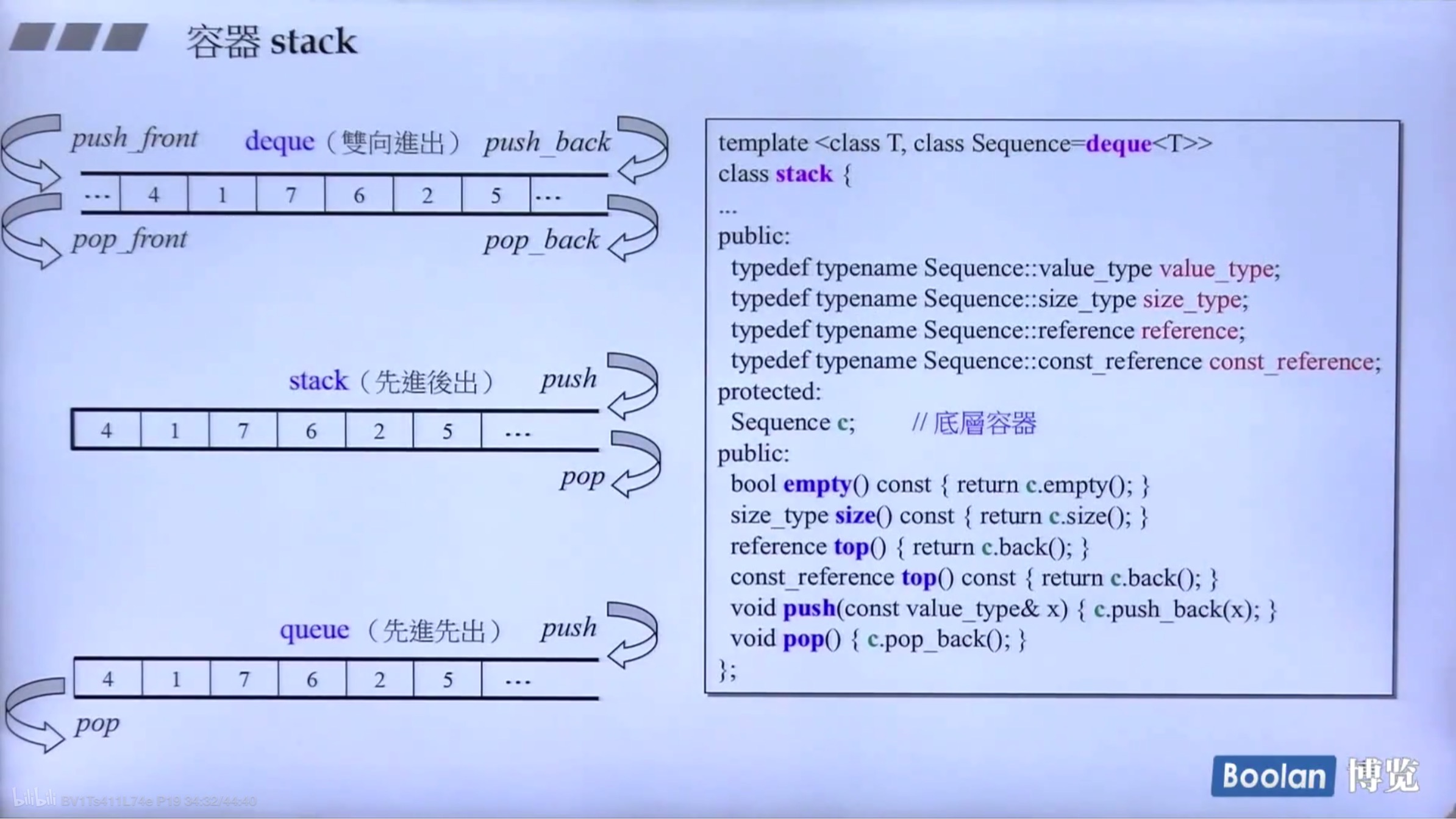-
Notifications
You must be signed in to change notification settings - Fork 51
cpp_std_stack
jiaxw32 edited this page Jul 18, 2020
·
4 revisions

模版定义
template <class Type, class Container= deque <Type>>
class stack- Type: 要存储在堆栈中的元素数据类型。
- 用来实现堆栈的基础容器的类型。 默认值为 deque <Type> 类。
适合堆栈的基础容器类包括deque、 list 类和vector 类, 或者支持back、 push_back和pop_back操作的任何其他序列容器。
构造一个空的堆栈或者是基容器类副本的堆栈。
stack();
explicit stack(const container_type& right);示例:
#include <stack>
#include <vector>
#include <list>
#include <iostream>
int main( )
{
using namespace std;
// Declares stack with default deque base container
stack <char> dsc1;
//Explicitly declares a stack with deque base container
stack <char, deque<char> > dsc2;
// Declares a stack with vector base containers
stack <int, vector<int> > vsi1;
// Declares a stack with list base container
stack <int, list<int> > lsi;
// The second member function copies elements from a container
vector<int> v1;
v1.push_back( 1 );
stack <int, vector<int> > vsi2( v1 );
cout << "The element at the top of stack vsi2 is "
<< vsi2.top( ) << "." << endl; //output: 1
}向堆栈顶部添加一个元素。堆栈顶部是最近添加的元素所占据的位置,并且是容器末尾处的最后一个元素。
void push(const Type& val);示例
#include <stack>
#include <iostream>
int main( )
{
using namespace std;
stack <int> s1;
s1.push( 10 );
s1.push( 20 );
s1.push( 30 );
stack <int>::size_type i;
i = s1.size( );
cout << "The stack length is " << i << "." << endl;
i = s1.top( );
cout << "The element at the top of the stack is "
<< i << "." << endl;
}返回对堆栈顶部元素的引用。
reference top();
const_reference top() const;如果将的top返回值分配const_reference给, 则无法修改堆栈对象。 如果将的top返回值分配reference给, 则可以修改堆栈对象。
示例
#include <stack>
#include <iostream>
int main( )
{
using namespace std;
stack <int> s1;
s1.push( 1 );
s1.push( 2 );
int& i = s1.top( );
const int& ii = s1.top( );
cout << "The top integer of the stack s1 is "
<< i << "." << endl; //output: 2
i--;
cout << "The next integer down is "<< ii << "." << endl; //output: 1
}从堆栈的顶部删除元素
void pop();示例
#include <stack>
#include <iostream>
int main( )
{
using namespace std;
stack <int> s1;
s1.push( 10 );
s1.push( 20 );
s1.push( 30 );
stack <int>::size_type i;
i = s1.size( );
cout << "The stack length is " << i << "." << endl;
i = s1.top( );
cout << "The element at the top of the stack is "
<< i << "." << endl;
s1.pop( );
i = s1.size( );
cout << "After a pop, the stack length is "
<< i << "." << endl;
i = s1.top( );
cout << "After a pop, the element at the top of the stack is "
<< i << "." << endl;
}输出
The stack length is 3.
The element at the top of the stack is 30.
After a pop, the stack length is 2.
After a pop, the element at the top of the stack is 20.测试堆栈是否为空,如果堆栈为空,则为 true;如果堆栈不为空,则为 false。
bool empty() const;示例:
#include <stack>
#include <iostream>
int main( )
{
using namespace std;
// Declares stacks with default deque base container
stack <int> s1, s2;
s1.push( 1 );
if ( s1.empty( ) )
cout << "The stack s1 is empty." << endl;
else
cout << "The stack s1 is not empty." << endl;
if ( s2.empty( ) )
cout << "The stack s2 is empty." << endl;
else
cout << "The stack s2 is not empty." << endl;
}返回堆栈中元素数。
size_type size() const;示例
#include <stack>
#include <iostream>
int main( )
{
using namespace std;
stack <int> s1;
stack <int>::size_type i;
s1.push( 1 );
i = s1.size( );
cout << "The stack length is " << i << "." << endl;
s1.push( 2 );
i = s1.size( );
cout << "The stack length is now " << i << "." << endl;
}- Microsoft C++ 标准库
- 《侯捷 C++ 标准库体系结构与内核分析》